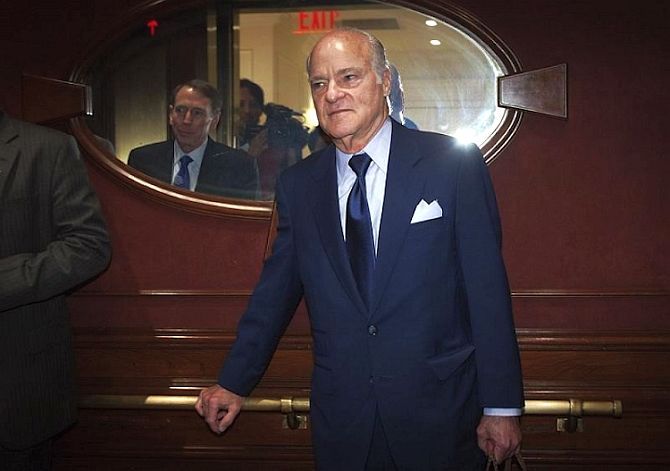'You have a stock market but don't have a long term bond market.'
'One of the things that would help the country more is to open up its markets'

Henry Kravis, co-chairman and co-CEO of private equity giant Kohlberg Kravis & Roberts (KKR), which has over $195 billion assets under management and a balance sheet of $16 billion visited Mumbai recently for a closed conference where he shared his views on the new governor at RBI, what India needs to fix, and PE's prospects for the long term. Edited Excerpts:
What's holding India back and where do economic reforms need to kick in harder?
You have a stock market but don't have a long term bond market.
Then you are putting all the onus on the banks to be the provider of capital and when the banks run out of capital, they have to stop because they are not sure what they want the RBI to do or not to do.
You will strangle mid-size and smaller companies, that happens.
That's the reason we set up two NBFCs here and we put to work a little over $7 billion in the last few years and will put to work more as we go forward in our credit business.
Its a real opportunity. I believe country should have broad and deep capital markets. The bankruptcy law is a good step.
My view is go to good banks and bad banks and take the tough medicine and take the asset quality stress test.
I would encourage the banks to do that here.
One of the things that would help the country more is to open up its markets - you have protected markets.
Just look at retail and a lot of private companies may be doing well in a protected market but if they were on a global stage they would operate a lot more efficiently with real competition.
On the India journey....
We started making investments here in 2006 and opened office in 2009 and our office here has 43 people.
Any fool can make an investment, that's easy but the more important thing is creating value.
We have metrics that we look at most say they do but don't. We start with 100-day plans and have an alignment with management and there's no misunderstanding - we really do act and think like industrialists.
Comments on change at the RBI?
I laugh when I see your government putting the pressure on the RBI because we have exactly the same issue in the US.
Right now President Trump is yelling and screaming that he does not like Jay (Jerome) Powell as the head of the Central Bank who is a pretty important guy.
That's because he's raising the rates and the markets go down a little and there's panic on it so its historical.
There is nothing new about governments trying to own central banks.
Central banks have to be independent and be able to do the right thing for growth and slowed or overheated economies.
Today there's excitement around a new RBI governor and there's also mid-term elections on, but tomorrow it won't matter.
On changing KKR's strategy in India because of changing socio-political market conditions...
Your inflation is not terrible. Oil prices are down so that helps.
Keep in mind, we are long-term investors and what we are good is buying a company improving its operations hold it for five to ten years on average and come out fine.
Do you have a government that is pro business? I would say yes. You're the fastest growing economy in the world right now.
You've said that you learn more from mistakes than wins - what has the biggest learning in India been?
I think the biggest learning we have, and we are changing that is, that we have been taking positions and didn't have the influence that we had in (deals) and I had hoped for that in some cases.
We got guaranteed returns and that turned out fine but that's all we got.
I think the other learning is we invest in dollars and the FX has just killed us. It hurt us.
That's just what it is and you have to factor it in when making interests here in India.
On KKR's biggest competition here
From where I sit we have heard for years that valuations are high and yes I liked it better when there was zero private equity out there but that was through the 60's through the 80's.
Now there isn't a country in the world that doesn't have some form of private equity. That's not our competition. Our competition is the stock market.
How the PE world has changed over the years...
When I take credit we have gotten ourselves into being a solutions provider for companies.
That's important because earlier it used to be - Mr Smith do you have a company for sale and when Mr Smith would have no interest in selling there was nothing more to talk about.
Today, we get to know Mr Smith, get to understand his company and see what he needs and we can invest in credit, invest in minority positions majority positions, invest in equity, help with his real estate, help make acquisitions around the world and thats where KKR is positioned today.
Investment areas KKR likes
We buy complexity and we sell simplicity and our investments may seem like a high price to the world is fine but they don't see that we are also in China and all of a sudden we just open up that market.
Example: we have a company called Nature's Bounty, in the vitamin business and has many brands that are well known, and are not in China at all but now have a partner opening up distribution for us and we can expand that business.
We are thinking of how we create more value in a company.
What we do not do is just go buy stock and hope that it goes up.
We are investing in infrastructure, education, waste management, and healthcare. You are under-bedded for hospitals. Big opportunity.
On credit...
We have gotten in a position that we have every type of capital a company might need.
We have minority capital, majority capital, we have preffered stock, subordinated debts to special situations.
We have teams in India that are totally different than what we have before.
Today we are focused on control positions or significant minority positions where we have rights.
Now much more in the credit business and can invest anywhere.
Two years we had 26 people now we have 43. That's the main change.
The view on buying businesses from conglomerates?
We tell large conglomerates around the world, let us buy your non-core businesses and we will make more money for you out of it through your minority position than holding on to 100 per cent.
We get the best CEOs, make decisions very quickly and bring in - I don't mean that in an arrogant sense.
it's just how we work. We have done that over and over and it is happening in India.
Read the history of the US and see how it developed. It takes time but will happen. I'm as sure of it as I am that I am sitting here.
Photograph: Carlo Allegri/Reuters












 © 2025
© 2025